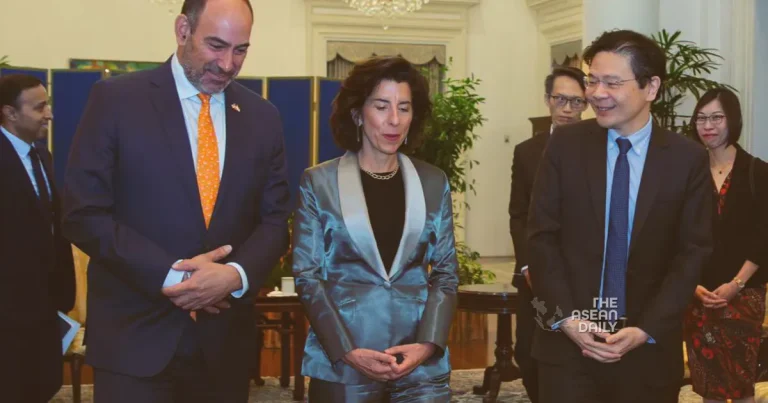7-6-2024 (SINGAPORE) Singapore is eagerly anticipating the conclusion of a trade agreement with member states of the Indo-Pacific Economic Framework for Prosperity (IPEF). Prime Minister Lawrence Wong expressed Singapore’s enthusiasm for this momentous pact, underscoring the nation’s commitment to fostering economic growth and prosperity through enhanced trade flows.
Addressing the IPEF Clean Economy Investor Forum at the Sands Expo and Convention Centre, PM Wong acknowledged the complexity of the negotiations, stating, “This is understandably a difficult issue with sensitive areas.” However, he reaffirmed Singapore’s determination, emphasizing, “Trade is the lifeblood of countries in this region, and we look forward to reaching a substantive agreement that will enhance trade flows amongst IPEF countries, and improve the lives of our people.”
The IPEF, launched in 2022, comprises a formidable coalition of 14 members, including economic powerhouses such as Australia, India, Japan, South Korea, and the United States. Collectively, these nations represent a staggering 40 percent of global gross domestic product and 28 percent of global goods and services trade, underscoring the immense potential of this framework.
With the overarching goal of promoting cooperation, prosperity, and peace, the IPEF has made significant strides in various initiatives, ranging from sustainability and economic growth to competitiveness. Underpinning these efforts are agreements on four pillars: trade, supply chains, the clean economy, and the fair economy.
PM Wong lauded the progress made thus far, highlighting the entry into force of the supply chain agreement in February 2024 and the conclusion of negotiations on the clean economy and fair economy agreements in 2023. In a symbolic gesture, Deputy Prime Minister and Minister for Trade and Industry Gan Kim Yong, along with other IPEF ministers, signed these pivotal agreements during a ministerial meeting on June 6, paving the way for their ratification, acceptance, and approval by member states.
Reflecting on Singapore’s longstanding advocacy for the United States’ active engagement in the region, particularly Southeast Asia, PM Wong emphasized the mutual desire to deepen ties. “Asean countries too are keen to deepen ties with the US, for they recognize that America continues to play an indispensable role, whether in maintaining the strategic environment or supporting economic growth,” he stated.
With a keen focus on accelerating the net-zero transition, PM Wong outlined three areas of emphasis for the IPEF’s clean economy initiative: clean energy infrastructure, scaling up new technologies, and financing. In a landmark announcement, he revealed that Vietnam, Singapore, and the US would form a working group on subsea cable development, laying the foundation for a region-wide clean energy infrastructure that could facilitate the export of surplus renewable energy from countries endowed with resources to energy-deficient neighbors like Singapore.
PM Wong highlighted the region’s vast potential for renewable energy sources, citing Thailand and Vietnam’s prowess in solar and onshore wind energy, Indonesia and the Philippines’ access to offshore wind and geothermal resources, and the hydropower potential of non-IPEF members Cambodia and Laos. The working group, he explained, would facilitate knowledge sharing, consensus building, and encourage investments in these capital-intensive assets, extending an open invitation to other IPEF countries to join the effort.
In the realm of scaling up new technologies, PM Wong acknowledged the progress made through cooperation and expertise sharing in areas such as green hydrogen, while expressing optimism for future collaborations in sustainable aviation fuels. He also highlighted the launch of two new financing initiatives – the Climate Fund and the Catalytic Capital Fund – aimed at investing in areas that support the transition to a clean economy.
Recognizing the untapped potential in carbon capture and storage (CCS), PM Wong commended Indonesia’s recent development of CCS-related legislation, the first of its kind in Southeast Asia. Building on this momentum, Singapore signed a letter of intent with Indonesia to collaborate on CCS projects, with the aim of catalyzing the deployment of cross-border CCS initiatives and accelerating the region’s transition to net zero.
On the financial front, PM Wong introduced Singapore’s ambitious blended finance platform, the Financing Asia’s Transition Partnership (Fast-P), designed to mobilize investments in sustainable development and climate action across the region.
US Commerce Secretary Gina Raimondo commended the IPEF members for their remarkable progress, transforming an idea into three groundbreaking agreements in just two years. These agreements, she noted, are strengthening supply chains, supporting clean economy transitions, and enhancing transparent and predictable business environments.
Raimondo revealed that IPEF member countries have brought clean economy projects worth a staggering US$23 billion (S$31 billion) for consideration by over 160 investors attending the forum, emphasizing the event’s action-oriented approach. “It’s pretty clear that this event isn’t here for us only to talk. We are taking action,” she declared.
The investor forum, a key feature of the IPEF, is designed to mobilize investments for the climate infrastructure and technology that the region urgently needs, such as the Asean Power Grid. In a separate press call, Raimondo disclosed that the forum succeeded in mobilizing capital from major investors, with Global Infrastructure Partners, KKR, and the Indo-Pacific Partnership for Prosperity forming a new coalition to catalyze infrastructure investment across IPEF emerging economies.
This coalition, which includes Allied Climate Partners, BlackRock, the Rockefeller Foundation, and Singapore’s Temasek and sovereign wealth fund GIC, boasts over US$25 billion in capital that can be deployed in Indo-Pacific emerging market infrastructure investments in the coming years.




